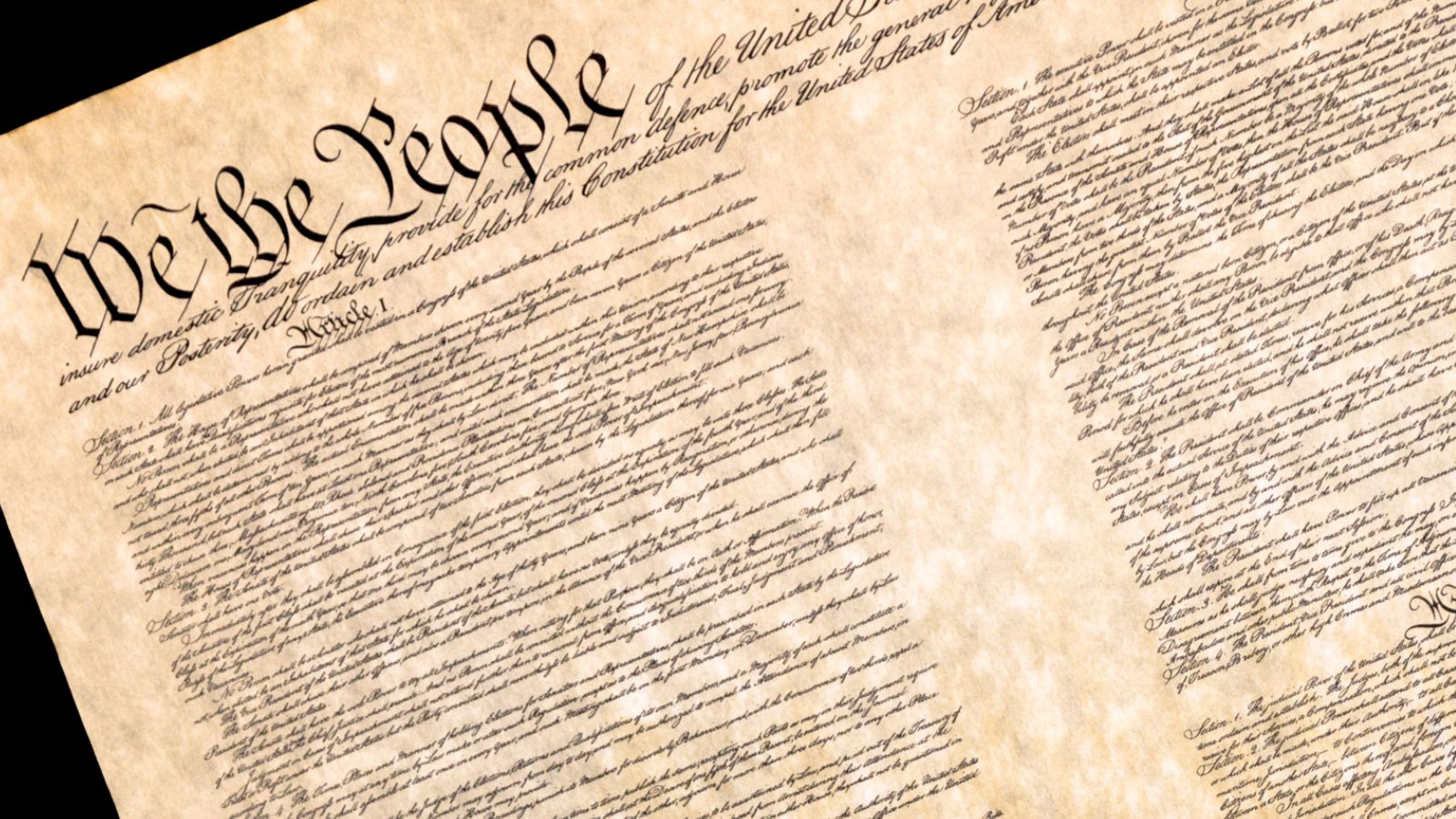America’s Constitution affords citizens a wide range of fundamental rights. Some have been added and updated over time, including outlawing slavery, allowing more Americans to vote, and ensuring equal access to public education. Here are 17 fundamental rights Americans are entitled to according to the Constitution.
Freedom of Religion

Under the First Amendment, Congress is prohibited from making laws that ban the free exercise of religion, and Americans have the right to practice any religion or no religion at all. The ACLU argues that the Founding Fathers “knew the best way to protect religious liberty was to keep the government out of religion,” so they guaranteed the separation of church and state.
Right to a Fair Trial

The Sixth Amendment guarantees a right to a public trial by an impartial jury and the right to a lawyer. American defendants also have the right to be informed of their charges and to know the evidence against them.
Freedom of the Press

Under the First Amendment, the right to circulate ideas, information, and opinions free from government censorship is guaranteed. Democracy relies on the ability to hold the government to account, with the press able to expose citizens to a wide range of opinions and information.
Right to Privacy

The right to privacy is not explicitly featured in the Constitution but has been derived from several amendments. A series of laws passed by Congress have also protected personal information, including the Privacy Act of 1974 and the Computer Fraud and Abuse Act.
Freedom of Speech

The Constitution’s First Amendment protects the right to express ideas and information without government interference, covering speech, written communication, and symbolic actions. However, as the United States Courts notes, there are some exceptions, and the “Supreme Court often has struggled to determine what exactly constitutes protected speech.”
Protection Against Self-Incrimination

The Fifth Amendment ensures that Americans cannot be compelled to testify against themselves. It applies to criminal cases and protects them from double jeopardy. It also includes the right to remain silent during law enforcement interrogations.
Right to Vote

The right to vote is protected by several amendments, including the 15th, 19th, and 26th, which have successively prohibited voting discrimination based on race, gender, and age (for those aged 18 and older). In recent years, several decisions by the Supreme Court and lower courts have been criticized for unnecessary and discriminatory efforts to restrict ballot access.
Right to Bear Arms

The Second Amendment guarantees Americans the right to keep and bear arms. Britannica notes it was ratified in 1791 after James Madison proposed it “to allow the creation of civilian forces that can counteract a tyrannical federal government.” The amendment is controversial, with debates about the degree of gun control, regulations, and background checks required to keep Americans safe.
Freedom of Assembly

The right to hold public meetings, demonstrations, and form associations without government interference is protected under the First Amendment. Peaceful protests and petitions to the government were allowed, allowing the Civil Rights Movement to push for equal rights for all Americans.
Equal Protection Under the Law

The 14th Amendment requires American states to provide equal protection under the law to individuals within their jurisdictions. This is the basis for civil rights protections against discrimination. Individuals who believe that the federal government or a state government has violated their rights to equal protection can bring a lawsuit against that government body.
Right to Counsel

Americans are guaranteed the right to legal representation in criminal prosecutions under the Sixth Amendment. It applies even if a defendant cannot afford an attorney, and led to the creation of public defender systems.
Protection from Cruel and Unusual Punishment

Under the Eighth Amendment, excessively harsh penalties, disproportionate sentences, or “cruel and unusual punishment” are barred. The Supreme Court has consistently ruled that the death penalty is not a violation of the Amendment, but there are exceptions, for example, for those who were under 18 at the time they committed their crime.
Right to a Jury Trial

FindLaw argues, “The right to a jury trial is one of the most important rights provided to criminal defendants in the United States.” It is guaranteed under the Constitution’s Sixth Amendment and Article III, Section 2, and is rooted in English common law.
Freedom from Slavery and Involuntary Servitude

Slavery and involuntary servitude were abolished in America by the 13th Amendment, which was ratified on December 6, 1865. It serves as the basis for combating human trafficking and forced labor in modern America and reinforces the fundamental human right to freedom.
Right to Amend the Constitution

The founders specified a detailed process for amending the Constitution in Article V, which has been successfully used several times in American history. Amendments require a significant consensus that reflects broad support to prevent arbitrary changes.
Protection Against Unreasonable Searches and Seizures

The Fourth Amendment protects Americans’ freedom from unreasonable government searches and seizures. Cornell Law School explains that it “does not guarantee protection from all searches and seizures” but generally prohibits warrantless searches of private properties “unless a specific exception applies.”
Right to Equal Access to Public Education

Although it is not explicitly stated in the Constitution, subsequent interpretations and legislation, like the Civil Rights Act and the Americans with Disabilities Act, support the principle of equal access to public education. In the 1982 Plyler v. Doe Supreme Court decision, it was ruled that the citizenship or immigration status of an individual’s parents or guardians cannot be used to stop students from attending public schools.
Read More: 19 Common Behaviors of Highly Intelligent People

Intelligent individuals often display a range of behaviors and qualities that set them apart from others. When exploring these characteristics, it’s crucial to comprehend that intelligence is a multifaceted attribute. Here are 19 essential behaviors and qualities frequently observed in highly intelligent people.
19 Common Behaviors of Highly Intelligent People
17 Things We Were Taught in High School That We Now Know Aren’t True

Well, this one may depend on when you went to high school, but for this millennial, these are the things we were taught in high school that have been proven not to be true. Personally, I still want to go back and correct every teacher who told me I wouldn’t always have a calculator in my pocket; the joke is on them.
17 Things We Were Taught in High School That We Now Know Aren’t True
16 Reasons Why Trump May Not Get a Second Term

Though Republican frontrunner Donald Trump thinks his trip back to the Oval Office is all but guaranteed, there are some real hurdles he has to get past. Here are the 16 obstacles that may stand in the way of a second term.
16 Reasons Why Trump May Not Get a Second Term
17 Most Dangerous Places to Live in the US – Cities to Avoid

Everyone wants to find a safe place to buy a house and put down roots in the US, but some cities are more dangerous than others. In this article, we’ll look at 17 cities that you may wish to avoid, according to recent findings.
17 Most Dangerous Places to Live in the US – Cities to Avoid
People Who Had Unhappy Childhoods Usually Develop These 18 Traits

People who go through a lot of traumatic experiences while they’re young can find themselves developing traits that stay with them through adulthood. What are these traits? You’ll find 18 of them in this article.
People Who Had Unhappy Childhoods Usually Develop These 18 Traits

